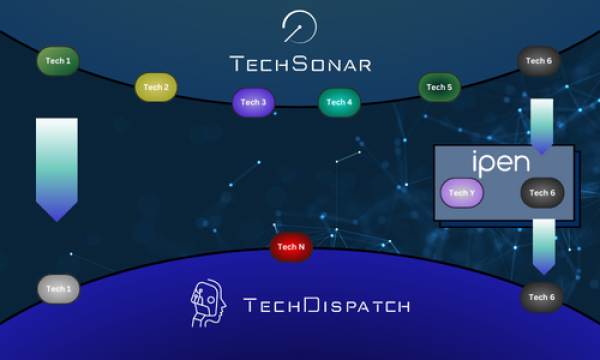Foresight
The increasing pace of digitalisation and the emergence of new and disruptive technologies has put data protection legislation to the test. Some emerging technologies just improve the speed or reliability of the way we process personal data, others are game changers that bring novel processing operations and challenge the applicability of data protection principles. Being proactive in performing technology monitoring has become a necessity for data protection authorities.
Key Role of the EDPS: The European Data Protection Supervisor (EDPS) understands the importance of assessing emerging technologies and its possible impact based on the European data protection legal framework. To this aim, the EDPS:
- Monitors and assesses technological developments such as quantum computing, central bank digital currencies or explainable artificial intelligence that could impact privacy.
- Understands the potential effects of tech-driven policies and provides expert opinions.
- Engages in public discourse about new technologies affecting privacy through initiatives like TechDispatch and Internet Privacy Engineering Network (IPEN) events.
- Acts as a reference point for the EU institutions, National Data Protection Authorities, and the general public, offering clarity on tech-related privacy concerns.
- Monitors and assess emerging technologies to identify those that could be used to build IT systems following the 'data protection by design' and 'date protection by default' approaches.
The EDPS encourages forward-thinking activities, aiming to proactively identify emerging technologies that might affect individuals' privacy and data protection. Among these activities are the publication of the TechSonar and the TechDispatch reports or the organization of Internet Privacy Engineering Network (IPEN) events. All these activities are part of the EDPS Tech Monitoring strategy as explained in the following paragraphs.
The EDPS’ Tech Monitoring Approach
At the EDPS, we do not see Tech Monitoring activities as isolated exercises. Most of our Tech Monitoring activities are intertwined so that our knowledge and comprehension of technological developments builds on successive layers and, so that we can bring the most added value to our policy making and supervisory activities.
To that aim, the EDPS follows an annual monitoring cycle represented in the graph below.

- With the help of the Joint Research Centre’s TIM Analytics service, the EDPS identifies early signals of emerging technologies. From these emerging technologies that could have an impact on data protection and privacy we select TechTrends for the mid-term horizon. For the short term horizon, we select TechTrends following an internal discussion. For more details on our TechSonar methodology, please check the “Methods” section of the latest TechSonar.
- The EDPS chooses one of TechSonar’s TechTrends as the topic for the following IPEN conference, gathering experts for in-depth discussions.
- Insights from the IPEN conference, coupled with EDPS's research, are then published in a dedicated TechDispatch.
Please note that the methodology described here represents a general working framework that is designed with flexibility in mind. This methodology will not limit the EDPS’ capacity to react to technological developments as need be. For example, we might have an IPEN event on more than one technology or focused on a technology that is relevant but was not part of a previous TechSonar issue, or we might issue TechDispatches on technologies that were not dealt with in an IPEN event.
The EDPS Technology Monitoring and Foresight approach encompasses several initiatives: the TechSonar, the TechDispatches and IPEN events.
TechSonar
Is the flagship of the EDPS foresight activities, in which we look at technologies with impact in two temporal frames: a short-term horizon of one year and mid-term horizon of three to five years. For each technology, that we call TechTrend, we give a concise but meaningful description, signal potential positive and negative impacts for data protection and suggest further readings.
TechSonar intends to be a first contact with technologies that we expect to be relevant in the short or medium term due to their potential effects in the processing of personal data. TechSonar is aimed at a broad public and intentionally avoids in depth descriptions and technical jargon. However, for those who would like to learn more, each TechTrend includes a short list of further readings that serve as the next step into the topic.
Find the full list of EDPS TechSonars here.
TechDispatch
Where TechSonar is a first and brief contact with certain technologies, TechDispatches are a deeper and closer look to specific technologies that are worth to be monitored by the EDPS.
TechDispatches offer factual descriptions, preliminary assessments on privacy impact, and recommended readings. Some TechDipatch issues might touch upon technologies included in TechSonar (e.g. central bank digital currency) while others might not (e.g. Facial Emotion Recognition).
TechDispatches avoid, as much as possible, technical or legal jargon but they include considerations on the impact that technologies have on the application of GDPR principles and data subject rights. Their intended audience is consequently narrower than the one of TechSonar.
Find the full list of EDPS TechDispatches here.
Internet Privacy Engineering Network (IPEN)
Established in 2014 by the EDPS, the IPEN initiative promotes the advancement of privacy engineering. It supports the creation of reusable tech tools and design patterns while fostering community collaboration among privacy engineers. At least once a year, the members of the IPEN meet to discuss about one or more topics related to privacy engineering.
IPEN events gather public authorities, academia, open source projects and private businesses in an effort to find engineering solutions to privacy challenges. IPEN events are also one of the EDPS means to foster the discussion on relevant technological trends. We use what we learn from this discussion in the rest of our Tech Monitoring deliverables.
Since 2020, each IPEN event focuses on a specific topic, ranging from synthetic data to explainable Artificial Intelligence. However, depending on the technological developments, IPEN could and will be dedicated to more than one topic or technology.
Find more information on our previous IPEN events here.